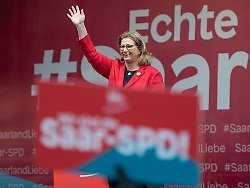updates
Change of power in Saarland
Anke Rehlinger and SPD are heading towards a one-party government
03/27/2022, 8:03 p.m
A change of power is imminent in Saarland: According to projections, the SPD will achieve a surprisingly clear victory. The incoming Prime Minister Rehlinger can increasingly hope for an absolute majority. CDU and left suffer severe losses.
According to projections, the SPD became by far the strongest party in the state elections in Saarland. This means that her top candidate, the previous Economics Minister Anke Rehlinger, will replace the incumbent CDU Prime Minister Tobias Hans. According to listening calculations and the counting of 45 out of 52 constituencies, the SPD can even govern without a coalition partner.
According to the ARD extrapolation, the Social Democrats can count on 43.7 percent of the votes. Compared to the 2017 election (29.6 percent), this means an increase of around 14 points. The CDU, on the other hand, falls to 28.3 percent (2017: 40.7 percent). Mathematically, a grand coalition would be possible again in Saarbrücken, as has been the case since 2012 – but now under the leadership of the SPD. Even an absolute majority of the seats is within reach for the SPD. It remains to be seen whether other potential coalition partners, the FDP or the Greens, will make it in at all.
Hans wants to draw “consequences”.
“It’s the result of hard work,” said Rehlinger in front of party members about her victory and thanked the entire state party. “The Saarland voted red,” Rehlinger called out to the cheering crowd. Dejected, however, was the election loser: “It’s really a bitter defeat for the CDU in the Saar,” said Hans, who was voted out. “I also take responsibility,” said the former prime minister, announcing “personal consequences” for “an election result that was also linked to me personally.” Which consequences will be decided on Monday.
The ARD extrapolation shows the following picture for the smaller parties: AfD 5.7 percent (6.2), Greens 5.0 percent (4.0) and FDP 4.9 percent (3.3). Entry into the state parliament is thus on the razor’s edge for the Greens. The FDP probably missed him. After 12.8 percent five years ago, the left would no longer be in the state parliament with only 2.5 percent. The party got into serious quarrels in the Saar – up to and including the resignation of its ex-federal chairman Oskar Lafontaine, who used to be the social-democratic prime minister. Accordingly, 10.0 percent of the votes go to parties that do not make it into the state parliament.
First woman at the head of the country
The deputy SPD Federal Vice Rehlinger would have made it to the top in her home country at the second attempt. The 45-year-old would be the first SPD head of government in the history of her country. Nationwide, there would then be four social democratic women at the head of a state government – more than ever before. The other parties from the Union to the Greens to the Left only have male heads of government.
Rehlinger went into the state elections with a clear lead in popularity. According to Infratest dimap, 53 percent would have voted for Rehlinger and 26 percent for Saarland Prime Minister Tobias Hans in a direct election, reports ARD. Rehlinger was therefore clearly ahead in terms of leadership, competence, credibility and sympathy. The most important issues for the voters were jobs, energy and climate as well as education and schools.
Based on the first figures, a coalition led by the SPD with both the CDU and the Greens would be able to win a majority in Saarland. It could also be enough for a social-liberal government or a traffic light coalition like in Berlin if the FDP makes it into the state parliament. On the other hand, even an absolute majority for the SPD would not be ruled out if several smaller parties failed at the five percent hurdle.
Hans’ future is open
The CDU has been the head of government in Saarbrücken for almost 23 years without interruption. However, Hans was his party’s top candidate for the first time. The 44-year-old took over the post in 2018 from Annegret Kramp-Karrenbauer, who then moved from Saarland to federal politics. In the election campaign, Hans left open whether he would also go into the cabinet as a vice president under Rehlinger if the CDU lost. In all polls, he had much lower popularity ratings than Rehlinger.
Saarland, with just one million inhabitants, is also the smallest of the federal states. The state parliament with 51 members is the smallest in Germany. Nevertheless, the election was also the first mood test for the traffic light coalition under SPD Chancellor Olaf Scholz and the Union under CDU chairman Friedrich Merz. “It’s a really big victory for the Saarland SPD,” said SPD General Secretary Kevin Kühnert. State elections in Schleswig-Holstein, North Rhine-Westphalia and Lower Saxony will follow this year. CDU General Secretary Mario Czaja spoke in Berlin of a “painful result” for the Christian Democrats. “The government mandate clearly lies with the SPD.”
